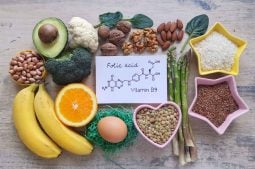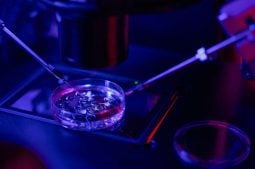
For the majority of women there is no need for any kind of hormone treatment in order to become pregnant. They only need to ensure that they are in optimal health for conception. For them, a healthy and varied diet is the simplest way to balance hormones to get pregnant. For the 12% of women who do have difficulty conceiving, it is possible that they will be prescribed hormone pills to regulate their endocrine system and get pregnant. Others, but only those who are undergoing a recognised infertility treatment, could be prescribed hormonal medication which is delivered by injection rather than pills. In the majority of cases where hormonal medication is required, the purpose is to stimulate the ovaries (the follicle growth) or regulate ovulation.
We should note at the outset that it is never advisable to take hormones to get pregnant, whether in the form of pills or any other medication, unless they have been prescribed by a doctor and are taken under medical supervision.
The natural way to balance hormones to get pregnant
The body’s natural hormone balance and the fluctuating levels of hormones regulating the monthly menstrual cycle are essential for conception and carrying a pregnancy to term. This natural balance can become disrupted, in a process which is usually gradual over many years. This disruption can be the result of a poor diet, being overweight or extremely underweight, environmental pollutants or even high levels of stress. You can damage your hormonal balance and as a result reduce your chances of conception in a number of ways:
- A poor diet that is high in processed foods and low in whole foods and fresh vegetables and fruit can result in a hormonal imbalance. Part of the problem is that many food preservatives contain xenohormones which have the ability to disrupt the endocrine system that manages the overall hormone balance.
- Weight management has a high impact on the body’s hormone balance. Women who are very underweight risk infertility through a lack of periods, which indicates a lack of ovulation. Overweight women, on the other hand, can have unusually high oestrogen levels which can also contribute to infertility. For men, obesity can increase the likelihood of low testosterone levels and poor sperm quality.
- Environmental pollutants such as adhesives and solvents, pesticides and herbicides and meat which has been treated with high levels of hormones can all disrupt the hormonal balance because they are also sources of xenohormones.
- High levels of stress increase stress hormones like cortisol which inhibits gonadotropin-releasing hormone (GnRH) which is the body’s main sex hormone and as a result ovulation, sperm count and libido can all be suppressed.
If you can get these areas of your life under control and avoid the most obvious pollutants, as well as taking other lifestyle measures such as not smoking, avoiding drugs and over-consumption of alcohol, you will be well on your way to balancing your hormone levels and increasing your chances of pregnancy.
When hormone pills to get pregnant are necessary
For women whose fertility problems are not resolvable by improving their general health, hormone pills or injections could be prescribed by a doctor as part of an infertility treatment. These fertility drugs have different functions. It may be to suppress the internal release of hormones in order to take external control of the cycle, to stimulate the ovaries to produce eggs or to trigger ovulation.
Assisted fertility treatments using hormone medication
Ovulation Induction:
One example of a hormone pill is clomiphene, an oestrogen-blocking drug. It causes the release of the GnRH hormones: Follicle Stimulating Hormone (FSH) and Luteinising Hormone (LH). These in turn stimulate your ovaries to produce eggs. Between 60% and 80% of women who take these fertility drugs do start to ovulate and of these, approximately half get pregnant, mostly within three cycles. During this treatment it is essential to have periodic scans so that the medical team can monitor the number of follicles which are developing (and hence the number of eggs which could potentially be fertilised) in order to keep them under control and avoid multiple pregnancies.
Ovulation induction is the first choice and the simplest of all fertility treatments. In this method, following the induction of ovulation, fertilisation takes place at home through intercourse in the normal way, on days determined by the medical team. If this is unsuccessful, the next step is intrauterine insemination.
Intrauterine Insemination (IUI)
Intrauterine Insemination always requires the use of fertility drugs. Because it is vital for the insemination to take place at exactly the right time, a sequence of fertility drugs is usually required:
- Ovarian stimulating drugs to induce the body to produce one or a maximum of two eggs.
- An ovulation ‘trigger’ injection of human chorionic gonadotropin is often used to pinpoint the ovulation with precision.
- Once conception has taken place, progesterone, which can assist in maintaining early pregnancy, may be given.
For more details on how the procedure works in our IVI clinics, see the Intrauterine Insemination (IUI) information on our website.
In Vitro Fertilisation (IVF)
IVF is of course the best known and most well-established method of assisted reproduction. It depends, among other things, on the use of fertility drugs and hormones for its success. Specific combinations of drugs used, and their timing and dosages, will depend on the individual patient but in broad terms, the stages follow a fairly standard pattern:
- Suppression of the ovulation cycle so that fertility practitioners can manage the timing of the process.
- Drugs to induce the ovaries into producing more than the normal single oocyte.
- A trigger dose of the hormone hCG to mature the eggs prior to their retrieval and fertilisation in the laboratory.
- After transfer of an embryo and pregnancy is confirmed, other fertility drugs like progesterone, as in the case of Intrauterine Insemination, may be administered to support the pregnancy.
To find out more about how the process works in our IVI clinics, take a look at our information about In Vitro Fertilisation.
If you have any concerns about your fertility, remember that it’s never advisable to take hormones to get pregnant without medical supervision. But it’s also good to know that there is plenty that doctors and fertility clinics can do to help you on the path to that longed-for pregnancy. Why not make a start by contacting us at IVI using our online contact form?
Key





Comments are closed here.